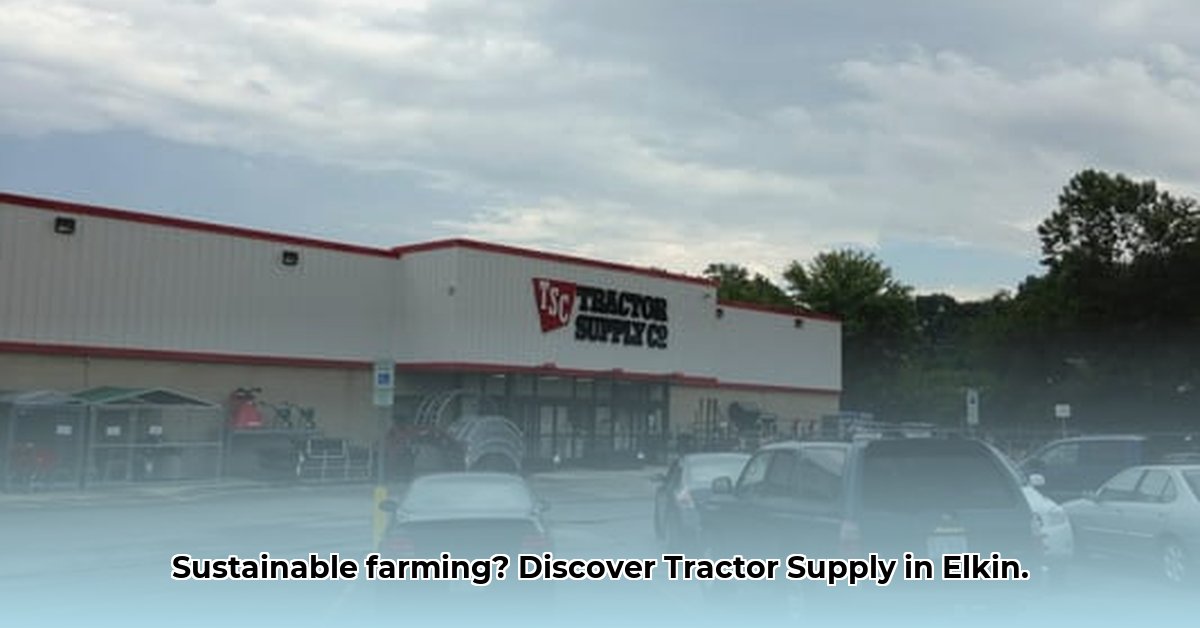
Tractor Supply's Role in Elkin's Sustainable Agriculture
Finding sustainable farming practices is crucial for both environmental health and community prosperity. Tractor Supply (TSC), a significant supplier of agricultural tools and materials in Elkin, NC, plays a key role in supporting local farmers. For more information on Tractor Supply in Elkin, visit this dedicated page. However, the extent to which TSC contributes to sustainable agriculture remains unclear due to a lack of publicly available data on their sustainability initiatives. This article explores TSC's potential to support sustainable farming while acknowledging the need for greater transparency and investigation.
Tractor Supply's Product Offerings: A Closer Look
TSC in Elkin offers a wide array of products relevant to farming, including seeds, tools, irrigation systems, and fencing materials. Many of these could be used in sustainable practices. For instance, efficient irrigation systems can reduce water waste, and durable tools minimize the need for frequent replacements. However, critical information about the sustainability of these products themselves is missing. Are the seeds organically sourced? Are the tools manufactured using eco-friendly processes? What is the carbon footprint associated with their production and transportation? This lack of information prevents a complete assessment of their contribution to sustainable agriculture.
The Urgent Need for Transparency: A Critical Gap
A significant hurdle in evaluating TSC's impact is the absence of readily accessible data on their sustainability practices. This data gap undermines efforts to understand their full environmental footprint. Key information is missing, encompassing:
- Supply chain transparency: Where are the products sourced? What are the environmental impacts of their manufacturing processes?
- Material sourcing: What materials are used in product creation, and are they ethically and sustainably sourced? Are recycled materials utilized?
- Environmental certifications: Does TSC seek or obtain any recognized sustainability certifications for their products or operations?
- Waste management: What is their waste generation rate, and what waste management practices are implemented?
- Carbon footprint: What is the total amount of greenhouse gases emitted throughout their supply chain?
This lack of transparency makes it extremely difficult to objectively evaluate TSC’s role in promoting sustainable farming. Without this information, any claims regarding their commitment to sustainability are unsubstantiated.
Unlocking Sustainable Potential: Hypothetical Scenarios
Let's imagine a scenario where TSC in Elkin actively promotes sustainable farming practices. This could involve:
- Increased organic seed availability: Offering a wider range of organic seeds would support soil health and reduce reliance on synthetic fertilizers and pesticides.
- Sustainable tool selection: Prioritizing tools made from recycled or sustainably harvested materials would decrease waste and resource consumption.
- Efficient irrigation solutions: Promoting and stocking water-efficient irrigation systems would conserve precious water resources.
- Partnerships with local farmers: Collaborating with local farmers and researchers could facilitate the development of sustainable farming best practices.
These changes could significantly enhance TSC's contribution to a more sustainable agricultural landscape.
Actionable Steps: A Collaborative Path Forward
Addressing the sustainability concerns necessitates a collaborative effort from various stakeholders:
Tractor Supply: Conduct a comprehensive sustainability audit across their entire supply chain, publicly releasing annual sustainability reports detailing progress and goals. (Efficacy metric: Reduction in carbon footprint by X% within Y years.)
Local Farmers: Prioritize purchasing products with recognized sustainability certifications and engage in open dialogue with TSC about their product sourcing and sustainability efforts. (Efficacy metric: Increased adoption of sustainably certified products by Z% within one year.)
Researchers & Universities: Conduct independent research analyzing the environmental impact of TSC products and practices, providing data-driven insights to inform TSC's sustainability strategies. (Efficacy metric: Publication of X peer-reviewed articles on the impact of TSC products within 3 years.)
Consumers: Demand greater transparency and sustainability from TSC and other businesses, supporting companies that prioritize ethical and environmentally responsible practices. (Efficacy metric: Increased consumer pressure leading to a Y% increase in the availability of sustainable products.)
By working together, these stakeholders can drive positive change, transforming TSC's contribution to Elkin's agricultural community. The future of sustainable agriculture depends on this collaborative effort. This requires TSC to actively engage, and consumers to demand greater transparency. The ultimate goal is not just to support farming but to build a more resilient and sustainable future for our community.
Conclusion: Growing a Sustainable Future Together
While currently lacking comprehensive data on their sustainability initiatives, Tractor Supply in Elkin possesses the potential to greatly enhance its contribution to sustainable agriculture. By addressing the existing data gap and through collaborative efforts among farmers, researchers, and TSC itself, significant progress can be made. Transparency and a commitment to sustainable practices are essential for a healthier and more prosperous future for Elkin's agricultural community. Let's work together to nurture this growth toward a more sustainable tomorrow.